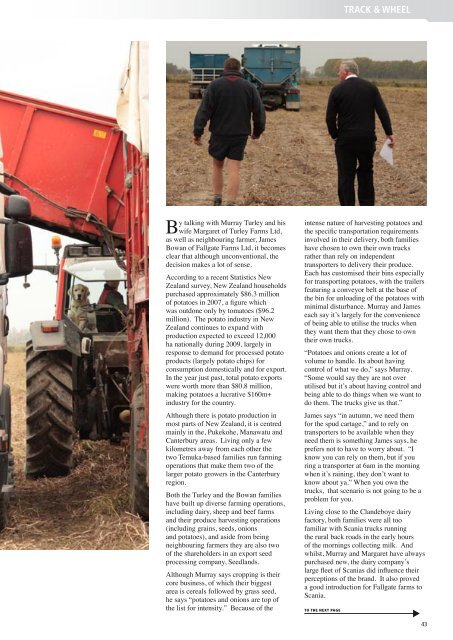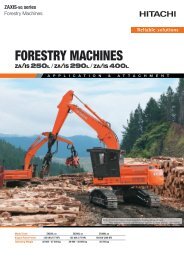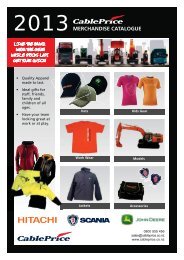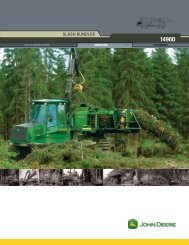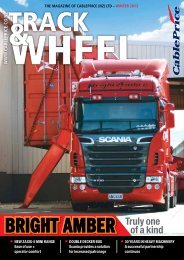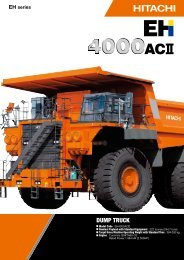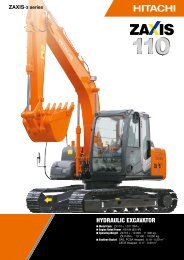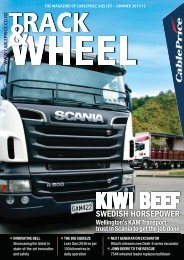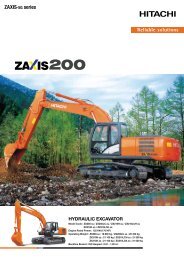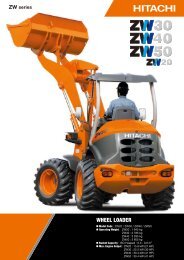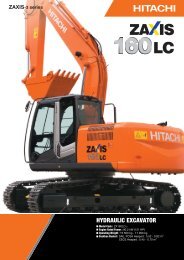It's Here! - CablePrice
It's Here! - CablePrice
It's Here! - CablePrice
Create successful ePaper yourself
Turn your PDF publications into a flip-book with our unique Google optimized e-Paper software.
TRACK & WHEELBy talking with Murray Turley and hiswife Margaret of Turley Farms Ltd,as well as neighbouring farmer, JamesBowan of Fallgate Farms Ltd, it becomesclear that although unconventional, thedecision makes a lot of sense.According to a recent Statistics NewZealand survey, New Zealand householdspurchased approximately $86.3 millionof potatoes in 2007, a figure whichwas outdone only by tomatoes ($96.2million). The potato industry in NewZealand continues to expand withproduction expected to exceed 12,000ha nationally during 2009, largely inresponse to demand for processed potatoproducts (largely potato chips) forconsumption domestically and for export.In the year just past, total potato exportswere worth more than $80.8 million,making potatoes a lucrative $160m+industry for the country.Although there is potato production inmost parts of New Zealand, it is centredmainly in the, Pukekohe, Manawatu andCanterbury areas. Living only a fewkilometres away from each other thetwo Temuka-based families run farmingoperations that make them two of thelarger potato growers in the Canterburyregion.Both the Turley and the Bowan familieshave built up diverse farming operations,including dairy, sheep and beef farmsand their produce harvesting operations(including grains, seeds, onionsand potatoes), and aside from beingneighbouring farmers they are also twoof the shareholders in an export seedprocessing company, Seedlands.Although Murray says cropping is theircore business, of which their biggestarea is cereals followed by grass seed,he says “potatoes and onions are top ofthe list for intensity.” Because of theintense nature of harvesting potatoes andthe specific transportation requirementsinvolved in their delivery, both familieshave chosen to own their own trucksrather than rely on independenttransporters to delivery their produce.Each has customised their bins especiallyfor transporting potatoes, with the trailersfeaturing a conveyor belt at the base ofthe bin for unloading of the potatoes withminimal disturbance. Murray and Jameseach say it’s largely for the convenienceof being able to utilise the trucks whenthey want them that they chose to owntheir own trucks.“Potatoes and onions create a lot ofvolume to handle. Its about havingcontrol of what we do,” says Murray.“Some would say they are not overutilised but it’s about having control andbeing able to do things when we want todo them. The trucks give us that.”James says “in autumn, we need themfor the spud cartage,” and to rely ontransporters to be available when theyneed them is something James says, heprefers not to have to worry about. “Iknow you can rely on them, but if youring a transporter at 6am in the morningwhen it’s raining, they don’t want toknow about ya.” When you own thetrucks, that scenario is not going to be aproblem for you.Living close to the Clandeboye dairyfactory, both families were all toofamiliar with Scania trucks runningthe rural back roads in the early hoursof the mornings collecting milk. Andwhilst, Murray and Margaret have alwayspurchased new, the dairy company’slarge fleet of Scanias did influence theirperceptions of the brand. It also proveda good introduction for Fallgate farms toScania.TO THE NEXT PAGE43


